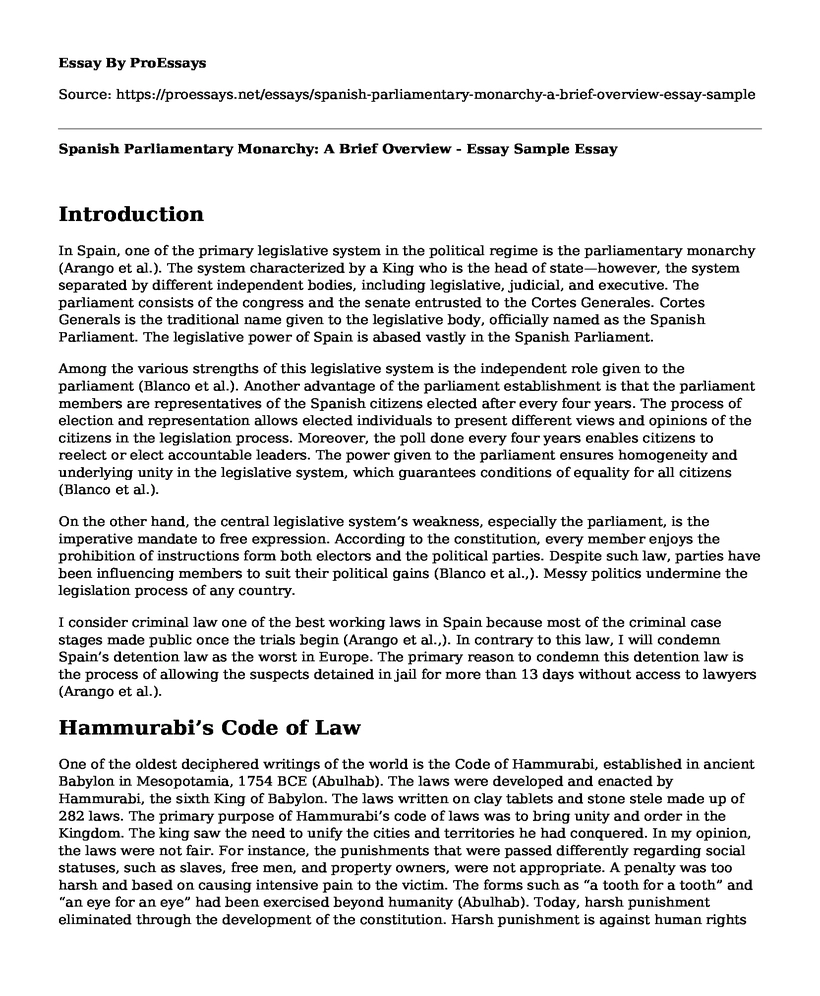Introduction
In Spain, one of the primary legislative system in the political regime is the parliamentary monarchy (Arango et al.). The system characterized by a King who is the head of state—however, the system separated by different independent bodies, including legislative, judicial, and executive. The parliament consists of the congress and the senate entrusted to the Cortes Generales. Cortes Generals is the traditional name given to the legislative body, officially named as the Spanish Parliament. The legislative power of Spain is abased vastly in the Spanish Parliament.
Among the various strengths of this legislative system is the independent role given to the parliament (Blanco et al.). Another advantage of the parliament establishment is that the parliament members are representatives of the Spanish citizens elected after every four years. The process of election and representation allows elected individuals to present different views and opinions of the citizens in the legislation process. Moreover, the poll done every four years enables citizens to reelect or elect accountable leaders. The power given to the parliament ensures homogeneity and underlying unity in the legislative system, which guarantees conditions of equality for all citizens (Blanco et al.).
On the other hand, the central legislative system’s weakness, especially the parliament, is the imperative mandate to free expression. According to the constitution, every member enjoys the prohibition of instructions form both electors and the political parties. Despite such law, parties have been influencing members to suit their political gains (Blanco et al.,). Messy politics undermine the legislation process of any country.
I consider criminal law one of the best working laws in Spain because most of the criminal case stages made public once the trials begin (Arango et al.,). In contrary to this law, I will condemn Spain’s detention law as the worst in Europe. The primary reason to condemn this detention law is the process of allowing the suspects detained in jail for more than 13 days without access to lawyers (Arango et al.).
Hammurabi’s Code of Law
One of the oldest deciphered writings of the world is the Code of Hammurabi, established in ancient Babylon in Mesopotamia, 1754 BCE (Abulhab). The laws were developed and enacted by Hammurabi, the sixth King of Babylon. The laws written on clay tablets and stone stele made up of 282 laws. The primary purpose of Hammurabi’s code of laws was to bring unity and order in the Kingdom. The king saw the need to unify the cities and territories he had conquered. In my opinion, the laws were not fair. For instance, the punishments that were passed differently regarding social statuses, such as slaves, free men, and property owners, were not appropriate. A penalty was too harsh and based on causing intensive pain to the victim. The forms such as “a tooth for a tooth” and “an eye for an eye” had been exercised beyond humanity (Abulhab). Today, harsh punishment eliminated through the development of the constitution. Harsh punishment is against human rights in which human life should be valued and punished accordingly.
The life and social structure at the time of Hammurabi’s laws were covered majorly on slander, worker’s duties, divorce, theft, slavery, trade, and liability. Almost half of the codes was grounded on the contracts, including wages to be paid and transaction terms. Also, the liability whenever there is damage to property. A third code majored on family issues such as inheritance, paternity, sexual behavior, and divorce. At this time, there were four social classes, amelu, king group, mushkenu, and ardu. The amelu consisted of persons with full civil rights liable for higher fines and harsher punishment. The group of the king included the court, professionals, artisans, and high officials. The mushkenu was a free man who, in most cases, had no land, paid fewer fines, and lived on a separate section of the city. On the other hand, the ardu was a slave who received payment from their master for upkeep. They could buy freedom and own property (Abulhab).
The most valued principles in the Mesopotamia’s society was ethics, equity and use of contracts, and the justice systems (Abulhab). The section of ethics meant a high sense of duty and a splendid view of life. Equity emphasized because of the existing thousands of business transactions and formal contracts. Justice system majorly considered in terms of punishing the wrongdoers and solving complicated cases (Zohair & Stephen 4). In modern society, the weak in terms of the law is rendered powerless and poor. It is evident in most cases that the laws are excessive differently according to social classes. The law protects the weak, but the law enforcers do not protect them.
Works Cited
Abulhab, Saad D. “The Law Code of Hammurabi: Transliterated and Literally Translated from Its Early Classical Arabic Language.” Blautopf Publishing, 2017. https://books.google.co.ke/books?hl=en&lr=&id=YuBCDwAAQBAJ&oi=fnd&pg=PP1&dq=Abulhab,+Saad+D.+%E2%80%9CThe+Law+Code+of+Hammurabi:+Transliterated+and+Literally+Translated+from+Its+Early+Classical+Arabic+Language.%E2%80%9D+Blautopf+Publishing,+2017&ots=kX9NO9LzC9&sig=liH9XcN8cVvDVAAzmbxv0uSfyBE&redir_esc=y#v=onepage&q=Abulhab%2C%20Saad%20D.%20%E2%80%9CThe%20Law%20Code%20of%20Hammurabi%3A%20Transliterated%20and%20Literally%20Translated%20from%20Its%20Early%20Classical%20Arabic%20Language.%E2%80%9D%20Blautopf%20Publishing%2C%202017&f=falseArango, E. Ramón, and E. Ramon Arango. “The Spanish political system: Franco’s legacy.” Routledge, 2019.
Blanco-Díez, Patricia, Montserrat Díez-Mediavilla, and Cristina Alonso-Tristán. “Review of the legislative framework for the remuneration of photovoltaic production in Spain: A case study.” Sustainability, vol. 12, no.3, 2020, 1214. https://doi.org/10.3390/su12031214
Zohair Husain, Mir, and Stephen E. Costanza. “Code of H Hammurabi.” The Encyclopedia of Corrections, 2017, pp. 1-4.
Cite this page
Spanish Parliamentary Monarchy: A Brief Overview - Essay Sample. (2023, Aug 23). Retrieved from https://proessays.net/essays/spanish-parliamentary-monarchy-a-brief-overview-essay-sample
If you are the original author of this essay and no longer wish to have it published on the ProEssays website, please click below to request its removal:
- The National Rifles Association Analysis
- Research Paper on Operation Phish Phry
- How USA Do Business With Other Countries Paper Example
- The Brexit Deal and Its Implications on Immigrations and Borders Essay
- Essay Example on Criminal Justice, Intercultural Prejudice, and Employment Opportunities
- Essay on Addressing Social Factors Affecting Population Health: The Need for Policy Advocacy
- 2020 Campaign: Exploiting Partisan Divide to Create Division - Free Paper Sample







